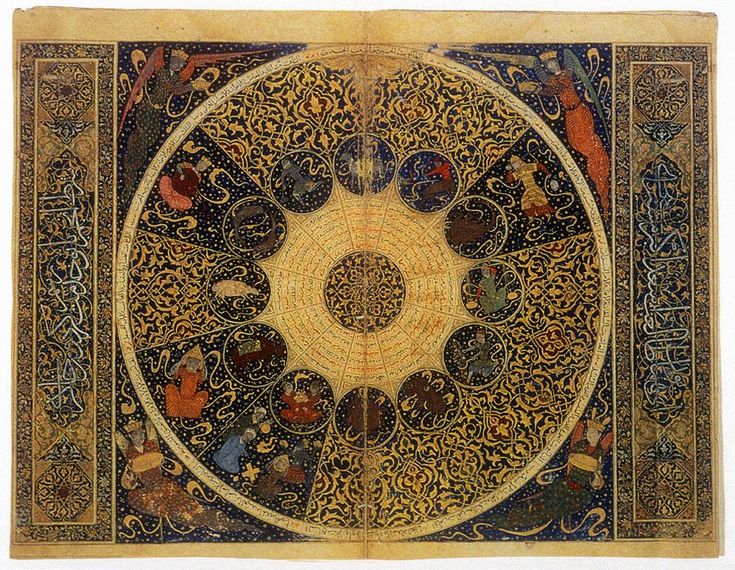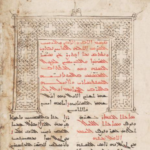
The seventh sūra in the order of ‘Revelation’ is Sūrat at-Takwīr, placed as the 81st sūra in the text. This sūra runs as follows: When the sun is covered, And when the stars fall down, And when the mountains are made to pass away, And when the camels are left abandoned, And when the wild beasts are herded together, And when the seas are filled, And when souls are united, And when the girl-child that was buried alive is asked For what sin she was slain, And when the pages are laid open, And when the sky is torn away, And when hell is kindled up, And when the Garden is brought nigh.
THIS PART OF THE SŪRA is almost a mirror image of the sermon of the priest Ibn Sā‘ida al-Ayādī[1] in which he intones the following:
He who lived has died. And whoever died has passed away. And everything that is to come will come: rain and vegetation, livelihood and sustenance, fathers and mothers, the living and the dead, that which is gathered and which dissipates, signs after signs, a dark night, a firmament on high, stars effulgent, earths that shake, heaving seas, light and darkness, righteousness and sin, food and drink, that which clothes and that which conveys – such are the most eloquent of warnings – wandering in deserts, contemplating graves. There is goodness in Heaven, and on earth lessons to be learnt, a dark night, constellations in the sky, gateways on earth and waves in the sea.
The priest Ibn Sā‘ida and Muḥammad were both influenced by the rhymes of the kuhhān seers.[2] The first part of Sūrat at-Takwīr, is nothing but a rhyme with a beautiful emotional impact, but a content devoid of any meaning or benefit. Muḥammad gives us several clauses in saj‘ rhyme that cannot happen or which people living could observe and verify. He says: When the sun is covered and he of course imagined that the sun was a flat disk that prostrated before the throne every night to ask permission to rise the next day.
All their interpretations are haphazard and uninformed. The verse remains a piece of rhymed prose that no one understands
He then says: And when the stars fall down – the Arabs of Muḥammad’s time did not know how the stars ‘fell down’, so the commentators had several schools of thought on this. Al-Qurṭubī says: ‘fall down – that is: tumble and scatter’ and adduced a hadith that has Muḥammad saying: “At that time every single star left in the sky will fall to the ground causing the people of the earth to panic”. Al-Ḍaḥḥāk said: “They fall because they are lanterns suspended between heaven and earth.” Naturally this was because in those days they did not know what stars were and fancied them as small objects that could fall down to Earth. They had no conception that a single star could be thousands of times larger than Earth, and dozens, even hundreds of times larger than our sun. If a star did actually fall to Earth, there would be no Earth left and no people remaining to panic, as Muḥammad said in the above hadith. And if all the stars fell down to Earth, these would merely be the tip of a pin of a single galaxy. If people and animals evaporated as soon as a star fell to Earth, who will see these conditions set by Muḥammad for the Day of Judgment?
And when the camels are left abandoned: The word for camel used here – ‘ishār – means a pregnant camel. So how would such a camel be left abandoned? The commentators say that the pregnant camel was the dearest thing for the Arabs, so when the Day of Great Assembly[3] comes and the Arabs rise from their graves and see their camels, they will not care about them because they will be preoccupied with themselves. This explains why they will be left abandoned. In fact, the unemployed or disabled is the neck of a woman without a necklaces and jewelry, as Imru’ al-Qays says:
A neck like the neck of a gazelle, not unseemly – when it is left sheer and unchained.
And when the seas are filled: The root sajar indicate something ‘filled’. The commentators say:
And when the seas are filled – this means they are filled up so that they tumble over each other and become as one thing. One says: ‘when its saltiness turns sweet’ (al-Qurṭubī).
The people of Mecca did not know much about seas, and did not know that they were originally connected to each other, and that they were one and the same thing. They were fascinated by this hadith and considered it proof of the power of God. Of course, there are no seas whose sweetness mingles with saltiness. All their interpretations are haphazard and uninformed. The verse remains a piece of rhymed prose that no one understands.
The requirements of the rhyme induced the rhymer to string together the largest number of words with similar endings
And when souls are united: in the language of the Qur’ān the soul is the person or the individual. The Qur’ān says: no soul knoweth in what land it will die.[4] So when he says: and when souls are united, he means when people are married. Here, the commentators were confused; some of them said that ‘marriage’ (al-ziwāj) here means that a man is united with the people doing what he does – that is, when the righteous are united together with the righteous, and the people of Hell with other people similarly destined for Hell. Others said that it was the ‘marriage’ of the righteous with al-ḥūr al-‘ayn (the wide-eyed houris’) (al-Qurṭubī). Souls thus become married together, and each befriends and associates with those who are like him, as they say in the proverb: ‘birds of a feather flock together’. There is no condition or threat contained in this verse; instead the requirements of the rhyme induced the rhymer to string together the largest number of words with similar endings.

Suggested Reading
And when the sky is torn away: the root k-sh-ṭ means ‘tearing off’ the skin from the camel or from the ram. It also means lessening the sticking power, that is, separating two conjoined things. So how does God ‘tear away the sky? The commentators said that God removes the sky from its place just as one removes the skin from a ram. Heaven, according to them, is a thick structure like a roof, something that God can dislodge from its place. This is due to their understanding of the verse that says: heavens and the earth were of one piece [5] – that is, cleaving together, andseparated by God. The term k-sh-ṭ also means removing protrusions, so we say: ‘I scraped the wall’, that is, I made it smooth. So how does it make the sky smooth?
All this festival before the torment reflects a sadistic spirit unworthy of the Lord of Heaven
And when hell is kindled up, And when the Garden is brought nigh: that is, when Allah ignites the fires of Hell and brings Paradise close to the pious, or the pious close to Paradise. All these conditions, which are rhymed by the Qur’ān, must have a conditional answer. What is the answer to the condition for this beautiful rhyme? Why does Allah do all these things? The answer is in the verse that follows: Every soul shall then know what it has prepared. All these imaginary miracles, when performed by God, will teach souls what they have done in this world. Now does the impending punishment have to be preceded by a festival that shows the greatness of God? What is the point of demonstrating the greatness of God on the Day of Judgment, when He will not allow sinners to return to this world to believe in Him and improve their behaviour? All this festival before the torment reflects a sadistic spirit unworthy of the Lord of Heaven.
Muḥammad grasped the opportunity provided by the Arabs’ fondness for poetry and rhyme, and so he gave them beautiful rhymes for things that are to happen on the Day of Resurrection. The Arabs were thus fascinated by these rhymes without evaluating their meaning. They could not evaluate them because they were ignorant of natural sciences such as physics and astronomy (except what they saw with the naked eye). So they believed Muḥammad and sacralised his Qur’ān for the beauty of its rhyme and because he introduced fear into their hearts about God’s punishment if they did not believe what Muḥammad was telling them.
Then the god of Muḥammad leaves aside the miracles mentioned, and begins swearing an oath that has a special place in his heart, and says:
But nay! I swear by the planets, The stars which rise and set, And the night when it departs, And the morning when it brightens.
All the words in these verses sounded strange to Muḥammad’s contemporaries and they understood none of them. Yet they memorized them for the beauty of their rhymes. The commentators say this: “Al-khunnas are the planets because they are stained during the course of the day, and it is said that they are the planets that continually wander. Al-Ḍaḥḥāk said that these khunnas are the five planets – Saturn, Jupiter, Mars, Venus, Mercury – because these become stained during their course, and are swept away (i.e. hidden). It is clear from their explanation that they did not know the meaning of these words, nor even the difference between planets and stars, and so they came up with explanations that can only appeal to empty minds.
This sūra is a veritable painting of rhymes but is devoid of any content that may be useful to anyone wishing to understand the message of Islam
As for And the night when it departs, their interpretation reveals how eager they were to explain words they did not know the meaning of. Al-Qurṭubī says:
The commentators have unanimously agreed that ‘as‘asa means ‘slip away’. They said it means ‘draw near its beginning and become dark.’ They also said: ‘it approaches its darkness’, and that ‘as‘asa means ‘depart’. Al-Khalīl says: ‘as‘asa means ‘approach or slip away’.
Do we actually understand what ‘as‘asa means? Where is this ‘consensus of the commentators’ that al-Qurṭubī referred to? This is the trick of the commentators; they always say that the scholars have been ‘unanimous’, or the Umma has been ‘unanimous,’ even though neither the scholars nor the Umma have been unanimous on anything since the first day that Islam appeared.

Suggested Reading
At the very least, one-fifth of the Qur’ān consists of verses containing words that are incomprehensible to Arabs, let alone non-Arabic speakers. Even so, the author of the Qur’ān says that it is a ‘clear Qur’ān’.[6] If this is the Makkan Qur’ān that Muḥammad came up with at the beginning of his call to convince the people of Makka, it is not surprising that Abū Lahab, Abū Jahl and Abū Sufyān described his Qur’ān as rhymes of the kuhhān and that Muḥammad was a kāhin.[7]
This sūra is a veritable painting of rhymes, but is devoid of any content that may be useful to anyone wishing to understand the message of Islam.
[1] Quss ibn Sāʽida al-Ayādī was the bishop of Najran in the 6th-7th century. Scholars argue that the young Muḥammad listened to his sermons at the famous market at al-Ukāẓ before the Revelation of the Qur’ān in 610. His eloquent Arabic expression became proverbial, as illustrated in the phrase ablagh min Quss (‘more eloquent than Quss’). (Ed.)
[2] Kāhin (pl. kuhhān) – ‘priest’, ‘seer’ – is cognate to the Hebrew term כֹּהֵן kōhēn. As a diviner the kāhin was an ecstatic and considered to be possessed by a jinni (‘spirit’), by means of whose power miracles could be performed. (Ed.)
[3] The Yawm al-Ḥashr, the day of assembling when souls will rise from their graves to attend the great reckoning. (Ed.)
[4] Qur’ān XXXI (Luqmān), 34.
[5] Qur’ān XXI (al-Anbiyā’) 30.
[6] The Qur’ān states in several places that it is in a clear language so that its listeners may easily understand it. Cf. Qur’ān XXVI (al-Shu‘arā’), 192-195: And lo! it is a revelation of the Lord of the Worlds, Which the True Spirit hath brought down Upon your heart that you may be of the warners, In plain Arabic speech; Qur’ān XII (Yūsuf), 2: Lo! We have revealed it, a Lecture in Arabic, that ye may understand; Qur’ān XIV (Ibrāhīm), 4: And We never sent a messenger save with the language of his folk, that he might make (the message) clear for them; Qur’ān XLIV (al-Dukhān), 58: So have We made it easy in your tongue that they may be mindful. (Ed.)
[7] Cf. Qur’ān LXIX (al-Ḥāqqa), 41-42: And it is not the word of a poet; little is it that you believe; Nor the word of a seer [kāhin]; little is it that you mind; Qur’ān LXII (al-Ṭūr), 29: Therefore continue to remind, for by the grace of your Lord, you are not a seer [kāhin], or a madman. (Ed.)
Main image: A Medieval Islamic celestial map
